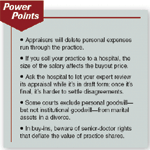Article
How to value your practice
Whether you're selling to a hospital or getting a divorce, you need to know the appraisal ropes.
So, what's your practice worth, Doctor?
In a good mood, you might say a million bucks. Or 10 bucks when you're an hour behind schedule.
However, there are times when you need a realistic figure. Maybe a hospital wants to buy your practice. Or maybe you're bringing in a partner, or merging with another group. Or you and your spouse are getting divorced. Each scenario usually requires a different appraisal process, which determines the level of expert help you'll need and how much you'll pay for it. You'll definitely need an expert, because practice appraisal is more than plugging numbers into a formula.
Appraisal 101: Subtracting those dog-food bills
If you've ever sold a house, you'll understand one method of valuing a practice-the market transaction approach. You come up with a number based on what similar practices in your area have sold for. But that's an imprecise method, partly because it doesn't drill down to the particulars of your own office.

Another way to determine goodwill is through "excess earnings capitalization." This method looks at the difference between how much you make and what you'd have to pay an employed doctor to take your place. You divide the difference by a capitalization rate generally set at around 20 percent. The result equals goodwill. Courts prefer this method in divorces because it tends to reflect a practice's current value, says Houston CPA Reed Tinsley, co-author of Valuation of a Medical Practice (John Wiley & Sons, 1999).
A third appraisal approach dispenses with valuing practice assets and arrives at a grand total by projecting cash flow into the future and discounting it back to its present value. This "discounted cash flow" approach takes into account inflation and forecasts for the healthcare industry. A cautious appraiser might factor in projected cuts in Medicare reimbursement beyond 2006, which could seriously devalue a practice with a waiting room full of seniors.
Don't be surprised if your appraiser uses all these methods to arrive at a fair market value, says Tinsley. True, he may place more weight on one approach than another, but his conclusion will boil down to professional judgment. This comes into play when appraisers "normalize" income and expenses by eliminating those that don't figure into the true value of a practice. Honorariums for CME lectures are a good example.
Normalizing expenses can produce big surprises for doctors who run personal expenditures through the practice that a buyer wouldn't consider legitimate. Consultant Keith Borglum in Santa Rosa, CA, recalls one doctor who brought his dog with him to the office and wrote off dog food as a "security supply." Deleting major expenses such as country club memberships make a practice look more profitable-good news if you're selling it, bad news if you're getting a divorce.





